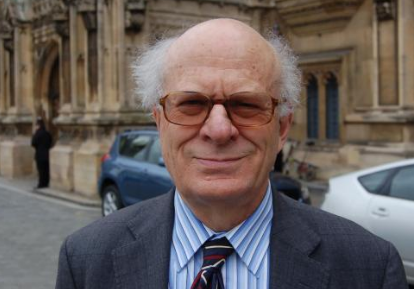
Jan 11, 2017 | News
It is with great sadness that the ICJ mourns the loss of Honorary Member Lord William Goodhart QC who passed away on 10 January at the age of 83.
Lord Goodhart, from the United Kingdom, was a long-serving friend of the ICJ, having served as a Commissioner from 1993-2007, on the Executive Committee and also as ICJ Vice-President. from 2007-2009 Lord Goodhart also served as the Chairman of JUSTICE, the ICJ’s independent UK Section.
Lord Goodhart was a Liberal Democrat peer of the UK House of Lords, a Member of the All Party Parliamentary Humanist Group and an eminent human rights barrister. He was knighted in 1989 and made a Life Peer in 1997 as Baron Goodhart of Youlbury.
Our thoughts and condolences are with his family and many friends.
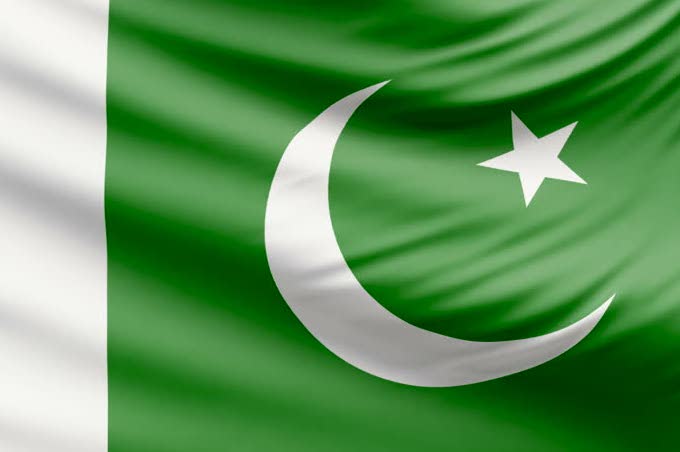
Jan 6, 2017 | News
As Pakistani military courts once again cease to have jurisdiction over civilians for terrorism-related offences, the Government must urgently reform the country’s criminal justice system, the ICJ said today.
Perpetrators of terrorist attacks must be brought to justice pursuant to fair credible trials and in accordance with due process, the human rights organization added.
The 21st Amendment and corresponding amendments to the Army Act 1952 are scheduled to lapse today, as their respective two-year sunset clauses expire. So far, the Pakistani Government has not proposed any legislation to extend the jurisdiction of military courts to conduct trials of civilians, the ICJ says.
The Geneva-based organization has published an updated list of people convicted by military courts, the charges against them, and their alleged organizational affiliations.
“The lapse of the jurisdiction of military courts over civilians is a step in the right direction, but unsurprisingly, there is no sign of the promised reforms to strengthen the ordinary criminal justice system to effectively handle terrorism-related cases,” said Sam Zarifi, ICJ’s Asia Director.
The National Action Plan envisioned military courts as a short-term “exceptional” measure to try “terrorists”, to be operational only for a two-year period during which the Government would bring about necessary “reforms in criminal courts system to strengthen the anti-terrorism institutions.”
“The Pakistani Government must not re-enact legislation to continue secret military trials of civilians, nor resort to more short-term, short-sighted security measures that are contrary to human rights protections,” Zarifi added.
Instead, the Government should urgently invest in enhancing the capacity and security of judges, investigators and prosecutors to make the regular criminal justice system more effective in conducting fair, credible terrorism trials and bringing perpetrators to account, the ICJ says.
According to military sources and ICJ’s monitoring of military trials in Pakistan since January 2015, military courts have convicted 274 people for their “involvement” in terrorism-related offences, 161 of whom have been sentenced to death.
Twelve out of the 161 people sentenced to death have been hanged, 113 people have been given prison sentences. Details of only seven people given life imprisonment have been made public. The names, charges, and duration of prison terms for the remaining 106 people have not been disclosed.
Contact
Sam Zarifi, ICJ Asia Pacific Regional Director (Bangkok), t: +66 807819002; e: sam.zarifi(a)icj.org
Reema Omer, ICJ International Legal Adviser for Pakistan (Lahore), t: +923214968434; e: reema.omer(a)icj.org
Read also
Pakistan: stop military trials for civilians
Pakistan: ICJ urges Government not to extend oppressive counter-terrorism law
Additional information
At least 159 out of 168 people (95 per cent) whose convictions have been publicly acknowledged by the military had allegedly “admitted” to the charges, raising serious questions about the possibility of torture or other coercive measures being used to secure these confessions.
The ICJ’ 2009 global study on state responses to security threats examined in detail the dangers of the “exceptionalism doctrine”, which justifies a departure from the normal legal processes and human rights protections on the basis of the “exceptional” character of the threat.
In time, many of these measures became permanently incorporated into ordinary law, blinding governments to the actual reasons behind the lack of accountability for terrorism and serious crime.
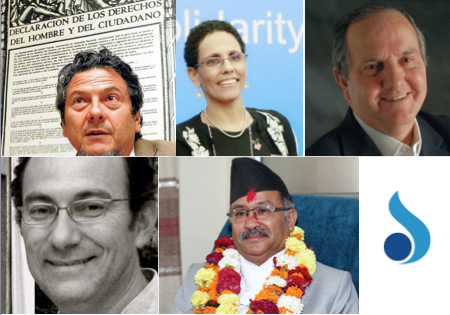
Jan 5, 2017 | News
Mr Reed Brody (United States), Ms Roberta Clarke (Barbados/Canada), Professor Juan Mendez (Argentina), Mr Alejandro Salinas Rivera (Chile) and Justice Kalyan Shrestha (Nepal) have recently been elected to join the ICJ.
The new Commissioners were elected by a ballot of existing Commissioners, which took place between November and December 2016.
Mr Reed Brody (United States) has 25 years on the cutting edge of the human rights movement. Mr Brody has worked, amongst other things, as a freelance activist, New York Assistant Attorney General, Director of the ICJ’s Centre for the Independence of Judges and Lawyers, Executive Director of the International Human Rights Group (now Global Rights), Director of the Human Rights Division of the UN Observer Mission in El Salvador, Deputy Director of the UN Secretary General’s Investigative Team in the Democratic Republic of Congo and at Human Rights Watch, including on such cases as those against the former Chilean dictator, Augusto Pinochet, and the former dictator of Chad, Hissène Habre.
Ms Roberta Clarke (Barbados/Canada) has an extensive background in working on human rights issues, particularly in relation to women’s rights and social and economic rights. Ms Clarke has held a number of Academic roles including Research Assistant, Junior Research Fellow, Assistant Lecturer and now Visiting Fellow at the University of West Indies. Ms Clarke has also worked as an Attorney in private practice and in a number of civil society and intergovernmental organization roles including as the Project Coordinator of the Women and the Law Project with the Caribbean Association for Feminist Research and Action in Trinidad and Tobago, Social Affairs Officer on the Gender and Development Programme for the UN Economic Commission for Latin America and the Caribbean, Regional Programme Director for UNIFEM/UN Women’s Caribbean Office and then for UN Women’s Regional Office for Asia and the Pacific.
Professor Juan Méndez (Argentina) is currently the UN Special Rapporteur on Torture and Other Cruel, Inhuman and Degrading Treatment or Punishment, having been appointed in November 2010 and then having had his mandate renewed in 2014. Professor Méndez is also a Professor of Human Rights Law in residence at the Washington College of Law. Previously Professor Méndez has worked in a number of human rights roles including as general counsel of Human Rights Watch, Executive Director of the Inter-American Institute of Human Rights in Costa Rica, Professor of Law and Director of the Center for Civil and Human Rights at the University of Notre Dame in Indiana, President of the Inter-American Commission on Human Rights of the Organization of American States, Special Advisor to the Prosecutor of the International Criminal Court, as Co-Chair of the International Bar Association Human Rights Institute, as President of the International Center for Transnational Justice (ICTJ) and as Kofi Annan’s Special Advisor on the Prevention of Genocide.
Mr Alejandro Salinas Rivera (Chile) is a lawyer from Chile with expertise in international issues and cooperation, mining and labour law. Alejandro has collaborated with and ran leading national and international human rights organizations. He has worked as a consultant and adviser for the ICJ as well as for the Ministry of Foreign Affairs, the International Parliamentary Union and the Presidential Advisory Commission for human Rights Policy. He has been the head of a number of Departments and Units in various government agencies including the Ministry of Foreign Affairs, as Director of the Human Rights Department; the Attorney General’s Office as Chief of the Unit of International Affairs; and at the Public Defender’s Officer as Chief of Staff of the National Defender, Head of the Evaluation, Control and Claims Department and Head of the International Cooperation Unit.
Justice Kalyan Shrestha (Nepal) was Chief Justice of the Nepalese Supreme Court from 2005 until his retirement in 2016. Prior to this he served in a number of judicial roles including as Chief Judge of the Appellate Court Jumla, a Judge of various Zonal, District and Appellate courts, Under Secretary in the Ministry of Justice and Law and as a Section Officer for the Supreme Court and Government of Nepal. Justice Shrestha has also held a number of senior roles in judicial bodies including as Chairperson of the Constituent Assembly Court, President of the South Asian Association for Regional Co-operation in Law, President of the Judges Society Nepal and as a Member of the Judicial Services Commission.
In addition to the election of five new members the following Commissioners have also been elected in the following capacity:
- Professor Carlos Ayala (Venezuela) – elected for a second term as Commissioner and a third term on the Executive Committee
- Justice Azhar Cahcalia (South Africa) – elected for a third term on the Executive Committee
- Professor Andrew Clapham (United Kingdom) – elected to the Executive Committee
- Professor Robert Goldman (United States) – elected for a second term as Vice-President
- Ms Hina Jilani (Pakistan) – elected for a second term on the Executive Committee
- Professor Sir Nigel Rodley (United Kingdom) – elected for a third term as President
- Professor Marco Sassòli (Switzerland) – elected for a second term as alternate to the Executive Committee
- Justice Stefan Trechsel (Switzerland) – elected for a second term as alternate to the Executive Committee
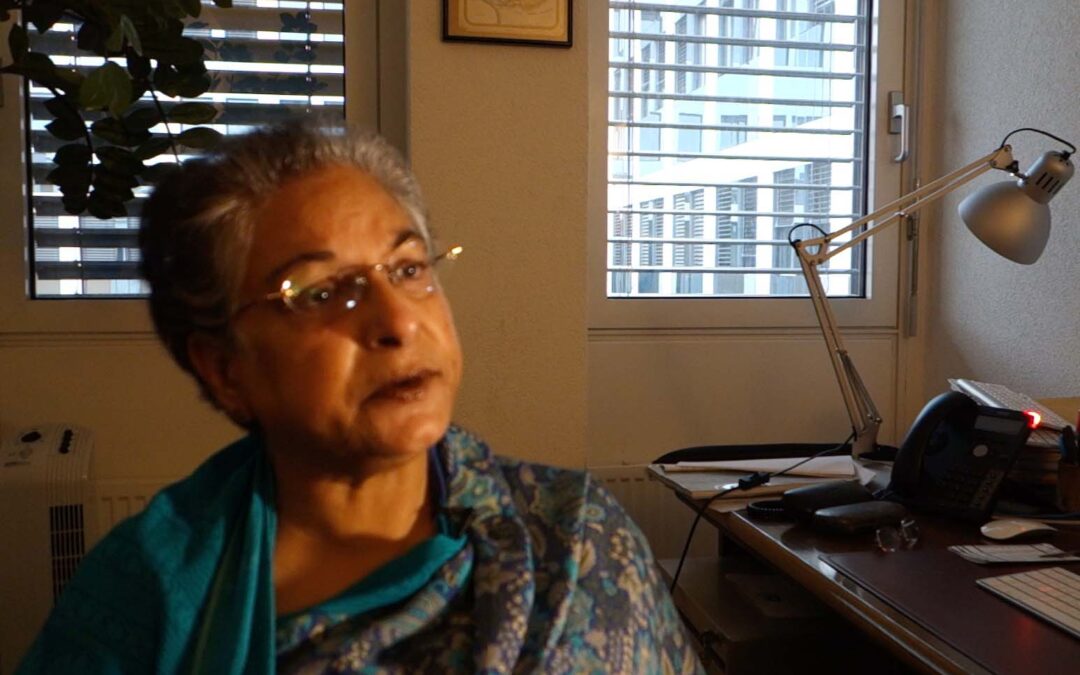
Dec 20, 2016 | Multimedia items, News, Video clips
The ICJ continues its profile series of women’s rights defenders with ICJ Commissioner Hina Jilani.
Hina Jilani is a human rights activist and an advocate of the Supreme Court of Pakistan, she has served as the first UN Special Representative on Human Rights Defenders to the Secretary-General and has been an ICJ Commissioner since 2013. In 1980, Hina co-founded Pakistan’s first all-female legal aid practice, AGHS Legal Aid Cell (ALAC).
Hina started her legal career at a time of an oppressive military government takeover in Pakistan. The government sought to legitimize their authority on the basis of Islam, which they interpreted as meaning lesser rights for women who were reduced to second-class citizens and denied the same rights as men. This sparked Hina’s passionate commitment to women’s rights work.
The women’s rights movement in Pakistan has declared itself a secular movement, having decided that it is better to separate the question of religion and universal rights. Hina said that Islam doesn’t deny rights to anyone but that when it is used by those in positions of authority they can interpret religion in ways that suit their own political needs and this results in inequality.
Domestic violence is a major problem in Pakistan and Hina said that most women will have experienced this in one form or another at some point in their lives.
Hina identified a lack of social mobility and social prejudices as key challenges that women in Pakistan face in accessing justice.
In a society where women are encouraged to stay at home many women are unable to access the legal and other services they may need if their rights are being abused. Many women do not even have an awareness of what their rights are, nor do they have access to information about their rights or the kinds of people that could provide them with this information.
In addition, where women do seek justice through the legal system they often encounter social prejudices from those administering that system.
However, although the Pakistani judiciary has traditionally been very conservative there has been a lot of progress in this area. Ms Jilani thinks this is a results of women’s rights advocates taking cases to courts and presenting these in a way that makes the social inequalities and injustices apparent and makes it easier for judges to make better decision that challenge these prejudices.
Ms Jilani recommends three steps for eradicating violence against women:
Firstly, it is essential to have strong legislation; having something anchored in the law makes it incumbent for authorities and institutions to provide women with protection and justice.
Secondly, there must be mechanisms on the ground that make it possible for women to assert their rights under any such legislation; this goes beyond legal support and will include cross-sectoral services such as women’s shelters.
Thirdly, there must be independent judges administering the legislation; judges must be independent not only of the executive but also of their own social prejudices.
Defending women’s rights in the courts of law has seen some significant victories in terms of clarifying the whole meaning of equality and equal opportunity. However, Hina said that the most difficult rights protection work women can do is defending women’s rights.
Women’s rights defenders “are seen as change-makers who are not necessarily liked so they are targeted”. They are often vulnerable to exclusion, social isolation and being discredited, both within their wider communities and also, often, within their own families.
Hina Jilani recommends that women who engage in rights defence work develop strong support networks that also makes link with other rights movements. The more it is apparent they are not acting in isolation, the better protected they will be.
Watch the interview:
The series of profiles introducing the work of ICJ Commissioners and Honorary Members on women’s rights was launched on 25 November 2016 to coincide with the International Day to Eliminate Violence against Women and the first day of the 16 Days of Activism Against Gender-Based Violence Campaign.
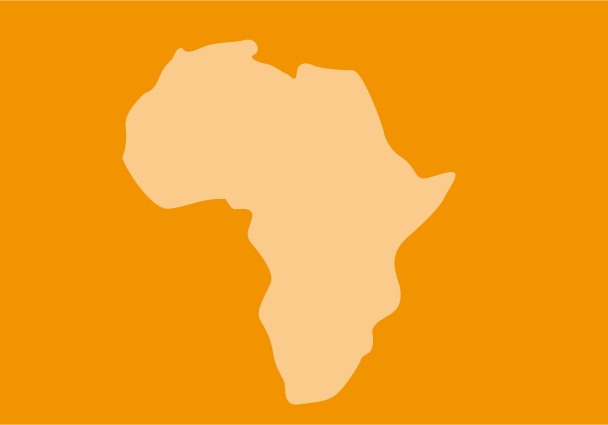
Dec 17, 2016 | News
The ICJ jointly convened a two-and-a-half day training workshop with the Raoul Wallenberg Institute.
The meeting congregated lecturers from the four law schools from around the country to look into options for the development of clinical legal education programmes.
One of the objectives of the meeting was to acquaint and equip law schools with the various models and approaches to clinical legal education.
To that end the workshop covered issues including: an overview of clinical legal education programmes and models for law clinics; developing clinical legal education curricula; clinical/interactive teaching methods; and practical placement of students with local, regional and international organizations.
This initiative was a first step in a Clinical Legal Education Programme which is a response by the ICJ to concerns from judicial officers on the quality of legal graduates.
The clinical legal education programme is part of a broader ICJ intervention, which is looking to better equip and motivate lawyers to effectively contribute to the maintenance of the rule of law and preservation of human rights.
The process was jointly facilitated by Professor David Mcquoid-Mason (President, Commonwealth Legal Education Association) and Alex Conte of the ICJ and the University of Sussex.
The 17 participant academics (ten males and seven females) who attended the meeting where drawn from the four law schools in Zimbabwe: the Faculty of Law from the University of Zimbabwe; the Herbert Chitepo Law School at the Great Zimbabwe University; the Zimbabwe Ezekiel Guti University; and the Midlands State University.
Additional participants where drawn from the Institute for Peace, Leadership and Governance, at Africa University.
The workshop was held with the support of the European Union Delegation to Zimbabwe (EU).









